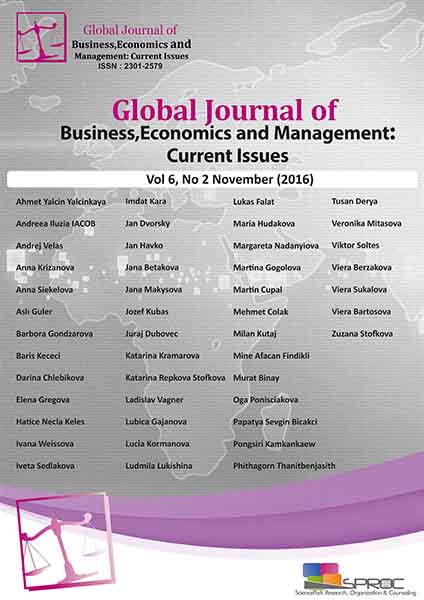How contribute strategic corporate brand management model? : Thai SMEs context and intention to leave
How contribute strategic corporate brand management model? : Thai SMEs context and intention to leave
Author(s): Pongsiri Kamkankaew, Phithagorn Thanitbenjasith, Suteera SribenjachoteSubject(s): Business Economy / Management
Published by: Birlesik Dunya Yenilik Arastirma ve Yayincilik Merkezi
Keywords: Strategic corporate brand management; corporate performance; SMEs; Thailand;
Summary/Abstract: The meaningfulness of work is defined as the importance of the purposes of work in people's view of life and attitudes. There are studies about the meaningfulness of work that describe not only its significant and positive contributions to the meaningfulness of people's lives, but also as taking pleasure in work, which has a variety of cognitive, emotional, behavioral and economic benefits. The meaningfulness of work defined as the importance of the purposes of work in people's view of life and attitudes can be connected with variables in the field of organizational behavior. The purpose of this study is to determine the effects and correlations among job satisfaction and intention to leave with a path analysis to be carried out as part of a research model for these variables. It is intended to contribute the literature by analyzing the effects and correlations among the variables with a structural equation model and to obtain data about employee behavior in organizational life. The universe of the study is comprised of employees of an insurance business in Istanbul. This study will use the following data collection tools: the "Work and Meaning Inventory" by Steger, Frazier,Oishi & Kaler (2012), the "Minnesota Satisfaction Questionnaire" developed by Weis and adapted to Turkish by Oran (1989), the "Intention to Leave Scale" by Wayne, Shore and Linden (1997) and “Perceived Stress Scale” developed by Cohen, Kamarck & Mermelste (1983) and adopted to Turkish by Bilge, Ögce, Genc & Oran (2007).Strategic corporate brand management (SCBM) and corporate performance are especially meaningful to become a new support management concept for SMEs today. However, SMEs less is served to how SCBM conceptualizing brought in order that it may produce the high effectiveness CP and their conceptualizing has not been still investigated appropriately, especially the SMEs of Thailand context. This paper seeks to develop a conceptual model for SCBM towards on SMEs corporate performance in Thailand. Drawing on reconsidering and analyzing the theoretical and empirical research are addressed the model. Based on the result provide that SCBM concentrating on the SMEs corporate performance pointedly the effect of distinctiveness, closely with firm characteristics, entrepreneurship, corporate brand element and competitive environment. The developed model devoted to great recognize the role of SCBM and how to enlarge the assistance of Thai SMEs corporate performance. Moreover, this paper increases to the previous research in which the attachment between other factors with SCBM was synthesized. The model advances to SCBM study by essence one of the SMEs development notions. In sum, it is recommended that Thai SMEs' entrepreneur should be accentuating more for their firm characteristics, entrepreneurship, corporate brand element, competitive environment and strategic corporate brand management. Furthermore, it should be address an evidence empirical study for a major gap in the area of SCBM.
Journal: Global Journal of Business, Economics and Management: Current Issues
- Issue Year: 6/2016
- Issue No: 2
- Page Range: 53-60
- Page Count: 8
- Language: English

